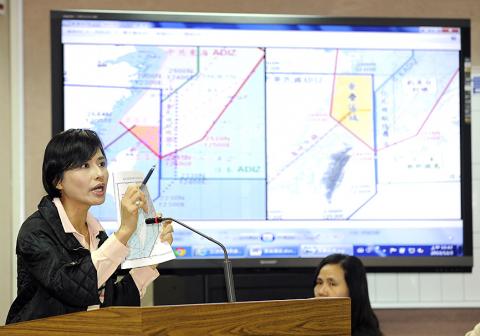The Legislative Yuan’s Foreign Affairs and National Defense Committee yesterday passed a motion chastising National Security Council (NSC) Secretary-General Jason Yuan (袁健生) for being absent from a committee meeting specifically held to address the government’s assessment of the situation following China’s unilateral declaration of an air defense identification zone (ADIZ).
Among the officials invited by the legislative committee were Yuan, Minister of National Defense Yen Ming (嚴明), National Security Bureau Director Tsai Der-sheng (蔡得勝), Minister of Foreign Affairs David Lin (林永樂), Deputy Minister of Transportation and Communications Chen Chun-ching (陳純淨) and Mainland Affairs Council Deputy Minister Chang Hsien-yao (張顯耀).
However, Yuan did not accede to the committee’s repeated requests to attend the meeting to report on the government’s stance and policies with regard to Beijing’s move to create the zone.

Photo: Chen Chih-chu, Taipei Times
The NSC is the main government unit that makes policies and decides on the responses to such issues, said committee convener Democratic Progressive Party (DPP) Legislator Chiu Yi-ying (邱議瑩), explaining why Yuan was summoned.
That the NSB secretary-general, who by rights should report to the legislature on all issues of national security and whose bureau is responsible for the government’s policy concerning the ADIZ, should be missing from such a crucial meeting was incredible, Chiu said.
In a vote, the committee later passed a motion condemning Yuan for his failure to attend the hearing.
At the meeting, DPP Legislator Tsai Huang-liang (蔡煌瑯) said the inaction of the administration of President Ma Ying-jeou (馬英九) when China was practically knocking at the nation’s door was only encouraging Beijing’s belligerence.
“Yuan [thinks he] is sly, but the committee is willing to give Yuan more time; it only takes five minutes to get to the Legislative Yuan from the NSC,” Tsai said before the vote was passed, adding that by refusing to attend the meeting Yuan was evidently trying to avoid his responsibility.
DPP Legislator Mark Chen (陳唐山), who has previously served as foreign minister, said that though there is a precedent for the NSC head being absent from the legislature, the establishment of the air zone should be considered an incident of grave importance and Yuan should have attended the meeting.
“Yuan must make a report to the legislature on this matter,” Chen said. “Only by doing so can the Ma administration show that it is being a responsible government.”
Meanwhile, DPP Legislator Chen Ou-po (陳歐珀) criticized the myriad stances of the officials in Ma’s Cabinet.
“At best, they only dare to say they regret China’s decision, but they have not expressed their opposition,” Chen Ou-po said.
Chen Ou-po then asked all five of the invited officials to “please raise your hand if you feel that China’s establishment of the ADIZ in the East China Sea is an unfriendly gesture.”
Yen, Tsai and Chen Chun-ching raised their hands, while Lin and Chang did not.
When pressed to make clear their stance on the issue, Yen said that China’s action was an “unfriendly” move and that although part of China’s air defense zone overlaps with Taiwan’s, Beijing “did not consult us beforehand.”
Lin said repeatedly that Taiwan has already expressed its stance on the issue, while Chang said the council has expressed its opinions to China’s Taiwan Affairs Office through the proper channels.

Chinese Nationalist Party (KMT) Chairman Eric Chu (朱立倫), spokeswoman Yang Chih-yu (楊智伃) and Legislator Hsieh Lung-chieh (謝龍介) would be summoned by police for questioning for leading an illegal assembly on Thursday evening last week, Minister of the Interior Liu Shyh-fang (劉世芳) said today. The three KMT officials led an assembly outside the Taipei City Prosecutors’ Office, a restricted area where public assembly is not allowed, protesting the questioning of several KMT staff and searches of KMT headquarters and offices in a recall petition forgery case. Chu, Yang and Hsieh are all suspected of contravening the Assembly and Parade Act (集會遊行法) by holding

PRAISE: Japanese visitor Takashi Kubota said the Taiwanese temple architecture images showcased in the AI Art Gallery were the most impressive displays he saw Taiwan does not have an official pavilion at the World Expo in Osaka, Japan, because of its diplomatic predicament, but the government-backed Tech World pavilion is drawing interest with its unique recreations of works by Taiwanese artists. The pavilion features an artificial intelligence (AI)-based art gallery showcasing works of famous Taiwanese artists from the Japanese colonial period using innovative technologies. Among its main simulated displays are Eastern gouache paintings by Chen Chin (陳進), Lin Yu-shan (林玉山) and Kuo Hsueh-hu (郭雪湖), who were the three young Taiwanese painters selected for the East Asian Painting exhibition in 1927. Gouache is a water-based

Taiwan would welcome the return of Honduras as a diplomatic ally if its next president decides to make such a move, Minister of Foreign Affairs Lin Chia-lung (林佳龍) said yesterday. “Of course, we would welcome Honduras if they want to restore diplomatic ties with Taiwan after their elections,” Lin said at a meeting of the legislature’s Foreign Affairs and National Defense Committee, when asked to comment on statements made by two of the three Honduran presidential candidates during the presidential campaign in the Central American country. Taiwan is paying close attention to the region as a whole in the wake of a

OFF-TARGET: More than 30,000 participants were expected to take part in the Games next month, but only 6,550 foreign and 19,400 Taiwanese athletes have registered Taipei city councilors yesterday blasted the organizers of next month’s World Masters Games over sudden timetable and venue changes, which they said have caused thousands of participants to back out of the international sporting event, among other organizational issues. They also cited visa delays and political interference by China as reasons many foreign athletes are requesting refunds for the event, to be held from May 17 to 30. Jointly organized by the Taipei and New Taipei City governments, the games have been rocked by numerous controversies since preparations began in 2020. Taipei City Councilor Lin Yen-feng (林延鳳) said yesterday that new measures by